
Altova today announced the release of Version 2022 of its MissionKit desktop developer tools and server software. Included in this is support for the new Open Information Model (OIM) XBRL standard in multiple products and other XBRL related enhancements.
The details of Altova’s XBRL-enabled software include
- XMLSpy offers complete XBRL and XBRL taxonomy development tools as well as full support for OIM
- RaptorXML Server supports high volume validation of OIM XML, CSV, and/or JSON files as well as automated generation of the different OIM output formats
- And Altova EBA XBRL Add-in for Excel, supports OIM and gives users the option of reporting reports built in Excel directly to EBA-conformant XBRL-CSV
In addition, this release includes some added XBRL-focused features such as a new option in XMLSpy to preload standard Formula and/or Table schemas and the ability to configure XBRL validation message limits and traces.
CodeSee Maps now available
CodeSee announced its new Review Maps to contextualize the potential impact of code changes, address feedback, and submit reviews all in one end-to-end experience. Code Maps can be useful to both the code author and the code reviewer.
For the code author, Code Maps reassures them that everything is accounted for, including deleted files, edge cases, tests, and more. For the code reviewer, Code Maps provides a way for them to visualize a change and understand what they will be reviewing. This allows the review to grasp how impactful a change is and whether or not it is isolated and the impact it could have on other areas of the codebase.
Available features in Code Maps include
- Side-by-side code comparison
- Intuitive grouping
- Identifying dependencies
- Adding comments
- A progress bar
- And submitting code reviews
Kotlin support for protocol buffers
Google announced that it will be deepening its support for the Kotlin language with official support for Kotlin in the open-source Protocol Buffers project (protos), Google’s platform-neutral, high-performance data interchange format.
From a proto definition, users can now use the new built-in Kotlin support in the proto compiler to generate idiomatic Kotlin Domain Specific Languages (DSLs). With this release, proto brings users a set of DSL methods that make code idiomatic in Kotlin.
In addition, the Kotlin version uses Kotlin type-safe builders, making it concise and removing the need to call a build method.
CyberRes announces Voltage SecureData services
CyberRes today announced the release of Voltage SecureData Services, a cloud-native data protection offering that allows for the deployment of data security solutions within business applications in the cloud. With this release, Voltage will not deliver data privacy and protection as cloud-native services in AWS, Azure, and Google Cloud Platform.
This introduction is the latest in a series of new CyberRes Voltage product introductions designed to assist users in accelerating their time-to-value in cloud ecosystems. In addition, the need to solve regulatory challenges is also addressed by default in auto-scaling variable workloads. Voltage SecureData Services supports the dynamic scaling, cost-reduction, and increased efficiencies of cloud workloads with data protection built-in.






